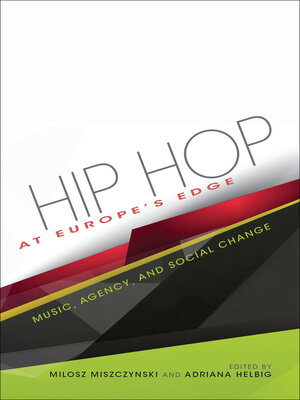
Sign up to save your library
With an OverDrive account, you can save your favorite libraries for at-a-glance information about availability. Find out more about OverDrive accounts.
Find this title in Libby, the library reading app by OverDrive.



Search for a digital library with this title
Title found at these libraries:
| Library Name | Distance |
|---|---|
| Loading... |
Essays examining the impact of hip hop music on pop culture and youth identity in post-Soviet Central and Eastern Europe.
Responding to the development of a lively hip hop culture in Central and Eastern European countries, this interdisciplinary study demonstrates how a universal model of hip hop serves as a contextually situated platform of cultural exchange and becomes locally inflected. After the Soviet Union fell, hip hop became popular in urban environments in the region, but it has often been stigmatized as inauthentic, due to an apparent lack of connection to African American historical roots and black identity. Originally strongly influenced by aesthetics from the United States, hip hop in Central and Eastern Europe has gradually developed unique, local trajectories, a number of which are showcased in this volume. On the one hand, hip hop functions as a marker of Western cosmopolitanism and democratic ideology, but as the contributors show, it is also a malleable genre that has been infused with so much local identity that it has lost most of its previous associations with "the West" in the experiences of local musicians, audiences, and producers. Contextualizing hip hop through the prism of local experiences and regional musical expressions, these valuable case studies reveal the broad spectrum of its impact on popular culture and youth identity in the post-Soviet world.
"The volume represents a valuable and timely contribution to the study of popular culture in central and eastern Europe. Hip Hop at Europe's Edge will not only appeal to readers interested in contemporary popular culture in central and eastern Europe, but also inspire future research on post-socialism's unique local adaptations of global cultural trends." —The Soviet and Post-Soviet Review
"The authors of this edited volume do not romanticize and heroize the genre by automatically equating it with political opposition, a fate often suffered by rock before. Instead, the book has to be given much credit for presenting a very nuanced picture of hip hop's entanglement—or non-entanglement, for that matter—with politics in this wide stretch of the world, past and present." —The Russian Review
Responding to the development of a lively hip hop culture in Central and Eastern European countries, this interdisciplinary study demonstrates how a universal model of hip hop serves as a contextually situated platform of cultural exchange and becomes locally inflected. After the Soviet Union fell, hip hop became popular in urban environments in the region, but it has often been stigmatized as inauthentic, due to an apparent lack of connection to African American historical roots and black identity. Originally strongly influenced by aesthetics from the United States, hip hop in Central and Eastern Europe has gradually developed unique, local trajectories, a number of which are showcased in this volume. On the one hand, hip hop functions as a marker of Western cosmopolitanism and democratic ideology, but as the contributors show, it is also a malleable genre that has been infused with so much local identity that it has lost most of its previous associations with "the West" in the experiences of local musicians, audiences, and producers. Contextualizing hip hop through the prism of local experiences and regional musical expressions, these valuable case studies reveal the broad spectrum of its impact on popular culture and youth identity in the post-Soviet world.
"The volume represents a valuable and timely contribution to the study of popular culture in central and eastern Europe. Hip Hop at Europe's Edge will not only appeal to readers interested in contemporary popular culture in central and eastern Europe, but also inspire future research on post-socialism's unique local adaptations of global cultural trends." —The Soviet and Post-Soviet Review
"The authors of this edited volume do not romanticize and heroize the genre by automatically equating it with political opposition, a fate often suffered by rock before. Instead, the book has to be given much credit for presenting a very nuanced picture of hip hop's entanglement—or non-entanglement, for that matter—with politics in this wide stretch of the world, past and present." —The Russian Review







